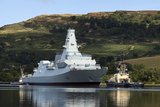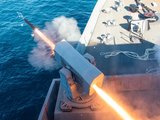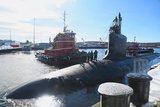Third OPV build underway
BAE Systems has started construction of the third River Class Batch 2 Offshore Patrol Vessel (OPV) for the Royal Navy, it was announced on 7 October.
The vessel is being built at BAE Systems’ shipyards on the Clyde as part of a £348 million contract to build three OPVs for the navy.
Construction of first of class HMS Forth started in October 2014 while the construction of the second OPV HMS Medway began in June.
The first vessel is expected to be delivered to the navy in 2017. These ships can be deployed globally and will be capable of ocean patrol with a range of in excess of 5,000 nautical miles and a maximum speed of 24 knots.
The ship will be the first to be designed using BAE System’s Shared Infrastructure operating system, which is to be rolled out across the navy’s surface fleet over the next 10 years. The hardware solution provides a smart, easily-updatable operating system for warships enabling all the systems needed to operate a ship to be loaded onto a single console.
Philip Dunne, UK Defence Minister, said: ‘These new ships will provide an important capability to the Royal Navy and our armed forces. They will perform vital tasks in defending the nation's interests around the world. This investment forms part of over £160 billion in our 10 year Equipment Plan which is funded out of the newly protected defence budget.
'Manufacture of these ships sustains over 800 quality engineering jobs here in Scotland, ensuring that the shipyards on the Clyde continue to sit at the heart of a thriving naval shipbuilding capability. They are paving the way for work to begin on our new T26 frigates next year.’
More from Naval Warfare
-
![Could Asia and the Middle East offer growth opportunities for Italy’s Fincantieri?]()
Could Asia and the Middle East offer growth opportunities for Italy’s Fincantieri?
Export campaigns for Fincantieri’s submarines and frigates are central to the company’s ambitions as billions of dollars in unawarded contracts come into focus.
-
![US Navy to develop an undersea networking capability to support UUV operations]()
US Navy to develop an undersea networking capability to support UUV operations
The NEREUS project aims to enhance and expand the US Navy’s existing communications systems, enabling crewed/uncrewed seabed and subsurface missions.
-
![How the Hedge Strategy will impact the US Navy’s future capabilities]()
How the Hedge Strategy will impact the US Navy’s future capabilities
The US Navy Hedge Strategy is intended to provide a lethal, modular and cost-effective fleet while accepting Washington’s fiscal and industrial constraints.
-
![US Navy and Raytheon explore additional applications for Mk 58 CRAW torpedo]()
US Navy and Raytheon explore additional applications for Mk 58 CRAW torpedo
Designed as an anti-torpedo and anti-submarine capability, the USN and RTX foresee the Compact Rapid Attack Weapon’s potential for deployment from surface ships and aerial and uncrewed platforms.






















